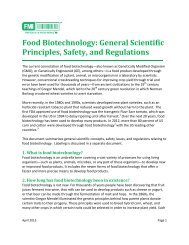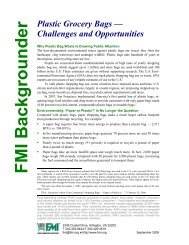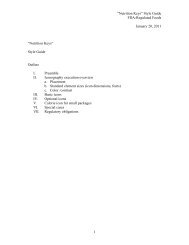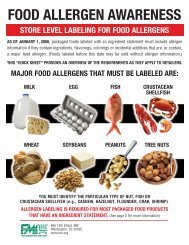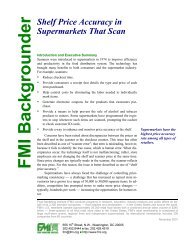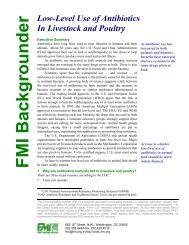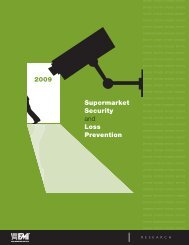Consumer Shopping Habits for Wellness and Environmentally ...
Consumer Shopping Habits for Wellness and Environmentally ...
Consumer Shopping Habits for Wellness and Environmentally ...
You also want an ePaper? Increase the reach of your titles
YUMPU automatically turns print PDFs into web optimized ePapers that Google loves.
Authenticity refers to the extent to which a company‘s activities are true <strong>and</strong> consistent with its<br />
values. While no company is perfect, authenticity dem<strong>and</strong>s that there be no gross contradictions<br />
between:<br />
1) What the company is <strong>and</strong> the practices within its control, 2) The products or services provided,<br />
<strong>and</strong> 3) The image of sustainability or responsibility that is promoted.<br />
Company Size <strong>and</strong> Influence on <strong>Consumer</strong> Perceptions of Sustainability<br />
Large companies in particular face hurdles in terms of consumer perceptions of sustainability<br />
practices. <strong>Consumer</strong>s are doubtful that big businesses – by virtue of their size, the broader economic<br />
l<strong>and</strong>scape in which they exist, their primary objective to maximize profit <strong>and</strong> the business practices<br />
necessary to do so – are able to be environmentally, socially, <strong>and</strong> economically sustainable.<br />
Interestingly, while they may voice these general opinions equating big business with an intrinsic<br />
difficulty in becoming sustainable, at the same time consumers feel that large companies also have<br />
the opportunity to raise awareness <strong>and</strong> have a large positive impact in areas implicated by their<br />
business due to the scope of their operations <strong>and</strong> reach.<br />
In contrast to large firms, consumers believe small, local companies to be the epitome of sustainable<br />
business. <strong>Consumer</strong>s are more likely to view small companies as those that serve <strong>and</strong> enrich their<br />
community. Small businesses are perceived as more flexible in setting monetary benchmarks <strong>and</strong><br />
more likely to consider the well-being of their customers <strong>and</strong> employees in seeking to achieve profits.<br />
<strong>Consumer</strong>s also think of small, local business as behaving more sustainably because they are <strong>for</strong>ced<br />
to be accountable, operating under the microscope of their local community <strong>and</strong> patrons.<br />
Additional Sustainability Findings<br />
More findings on Sustainability <strong>and</strong> related issues <strong>and</strong> their impacts on product purchases <strong>and</strong> retail<br />
settings may be found in subsequent chapters (Chapters 3 <strong>and</strong> 4, respectively).<br />
Impact of the Economic Recession on Health <strong>and</strong> <strong>Wellness</strong> <strong>Consumer</strong>s<br />
Full Impact Has Yet to be Seen<br />
During the primary, qualitative research phase of this project (January <strong>and</strong> February of 2009), most<br />
consumers were of course concerned about the economy. While we did not find that consumers had<br />
changed their daily activities <strong>and</strong> purchases in particularly profound ways, we did find a few patterns,<br />
including<br />
Putting off larger purchases<br />
Some, but not all, reported scaling back discretionary purchases<br />
Cutting coupons or looking <strong>for</strong> deals<br />
Dining out less often <strong>and</strong>/or at less expensive restaurants<br />
Finding ways to stay entertained at home <strong>and</strong> going out less often, <strong>and</strong>/or socializing at<br />
home or the homes of others<br />
In many ways, we believe that the economy had not been long enough into recession at the time of<br />
our primary research to produce extensive change in consumer behavior patterns. However, at the<br />
same time, we generally find that consumers‘ behavior patterns are fairly resilient, <strong>and</strong> often st<strong>and</strong> up<br />
42




